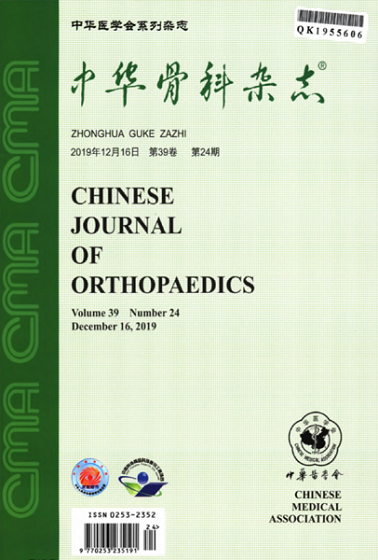Application of self-anchored lateral lumbar interbody fusion in lumbar degenerative diseases
Q4 Medicine
引用次数: 0
Abstract
Objective To evaluate the efficacy of self-anchored lateral lumbar interbody fusion (SA-LLIF) for lumbar degenerative diseases. Methods During January to December in 2019, a total of 41 patients with lumbar degenerative disease were treated with SA-LLIF, included 18 males and 23 females, aged 59.6±11.3 (range 49-77) years. There were lumbar stenosis and instability in 17 cases, disc degenerative disease in 8 cases, degenerative spondylolisthesis in 8 cases, degenerative scoliosis in 5 cases, postoperative revision in 3 cases. And osteoporosis was diagnosed in 5 of them. The index level included L2, 3 in 2 cases, L3, 4 in 11 cases, L4, 5 in 20 cases, L2-L4 in 3 cases and L3-L5 in 5 cases. After general anesthesia, the patient was placed in decubitus position. The anterior edge of psoas major muscle was exposed through 6 cm incision and extraperitoneal approach. Further, the psoas major muscle was properly retracted to expose the disc. After discectomy, the intervertebral space was prepared and moderately distracted. A suitable fusion cage filled with auto iliac graft was implanted. Two anchoring plates were inserted into the cage. Then, the caudal and cephalic vertebral body and the fusion cage were locked. Results The operation was performed successfully in all the patients. The operation duration was 79.0±19.5 (range 60-100) min. Intraoperative bleed loss was 38.0±28.2 (range 15-70) ml. The patients were followed up for averagely 10.6±4.6 (range 4-15) months. The visual analogue scale decreased from preoperative 6.2±2.1 to 1.6±1.1 and Oswestry disability index decreased from 47.8%±15.1% to 11.0%±7.3%. X-ray showed that the spine alignment recovered satisfactorily. No cage displacement was found. Sinking (2-3 mm) of cage was found in 7 patients without obvious symptom despite transient lumbar pain in an obesity woman. The lumbar lordosis recovered from 36.4°±10.2° to 48.0°±10.7°, and intervertebral height recovered from 8.3±2.5 mm to 11.3±3.3 mm. The rate of spondylolisthesis recovered from 19.7%±4.4% to 9.3%±5.3%. Conclusion SA-LLIF can provide immediate stability and good results for lumbar degenerative diseases with stand-alone anchoring cage without posterior internal fixation. Key words: Lumbar vertebrae; Intervertebral disc degeneration; Spinal fusion; Surgical procedures, minimally invasive自固定侧位腰椎椎间融合术在腰椎退行性疾病中的应用
目的评价自固定侧位腰椎椎体间融合术(SA-LLIF)治疗腰椎退行性疾病的疗效。方法2019年1 - 12月,对41例腰椎退行性疾病患者进行SA-LLIF治疗,其中男性18例,女性23例,年龄59.6±11.3岁(49 ~ 77岁)。腰椎管狭窄不稳17例,椎间盘退行性病变8例,退行性椎体滑脱8例,退行性脊柱侧凸5例,术后翻修3例。其中5人被诊断为骨质疏松症。其中L2、3 2例,L3、4 11例,L4、5 20例,L2-L4 3例,L3- l5 5例。全身麻醉后,将患者置于卧位。经6cm切口及腹膜外入路显露腰肌前缘。进一步,腰大肌适当后收露出椎间盘。椎间盘切除术后,预备椎间隙并适度分散。植入合适的自体髂移植物融合器。将两个锚板插入笼中。然后,锁定尾侧、头侧椎体和融合器。结果所有患者均手术成功。术中出血量38.0±28.2 ml (15 ~ 70) ml,平均随访10.6±4.6个月(4 ~ 15)个月。视觉模拟评分由术前的6.2±2.1分降至1.6±1.1分,Oswestry残疾指数由术前的47.8%±15.1%降至11.0%±7.3%。x线片显示脊柱恢复良好。未发现笼子移位。1例肥胖女性患者有一过性腰痛,但有7例患者无明显症状,发现笼子下沉(2-3 mm)。腰椎前凸度由36.4°±10.2°恢复至48.0°±10.7°,椎间高度由8.3±2.5 mm恢复至11.3±3.3 mm。脊柱滑脱率由19.7%±4.4%恢复至9.3%±5.3%。结论SA-LLIF治疗腰椎退行性疾病无需后路内固定,可获得即刻稳定和良好的疗效。关键词:腰椎;椎间盘退变;脊柱融合术;外科手术,微创
本文章由计算机程序翻译,如有差异,请以英文原文为准。
求助全文
约1分钟内获得全文
求助全文

 求助内容:
求助内容: 应助结果提醒方式:
应助结果提醒方式:


